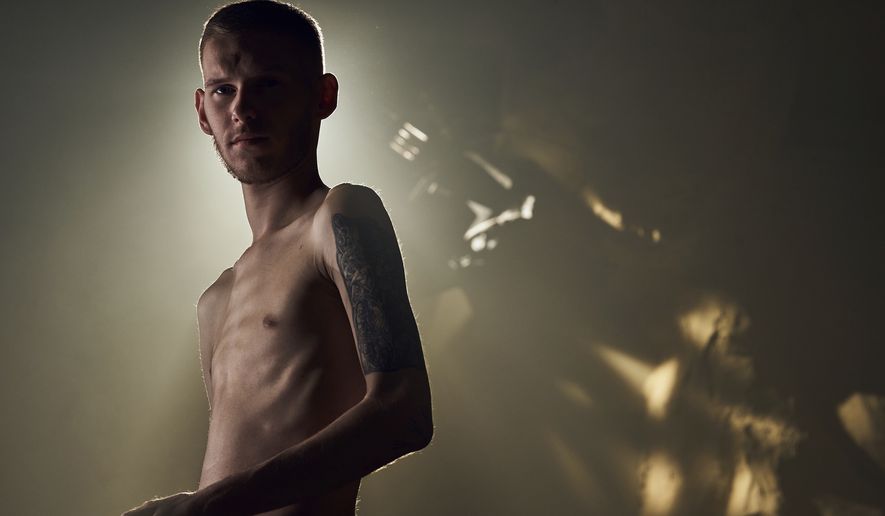Russian intelligence officials attempted to recruit captured members of Ukraine’s Azov Regiment to join a large-scale fight planned against Western Europe and the U.S., a senior leader of the unit said after being released.
Maj. Bohdan Krotevych, Azov Regiment chief of staff, was among the more than 2,000 Ukrainian service members captured in May when Russia overwhelmed the Azovstal steel plant in Mariupol after a bitter, bloody siege. He recalled in an interview how his captors attempted to chip away at his loyalty to Ukraine as part of a psychological pressure campaign spanning his four months as a prisoner of war near Moscow.
“They asked why I’m fighting,” Maj. Krotevych told The Washington Times last week. “They asked what is Ukraine for me. And they asked, ‘Why don’t you join us and fight against Europe and the USA?’”
The grillings were the only interruptions to otherwise endless spans of isolation. In total, Maj. Krotevych said, he spent 120 days in a 4-by-2-meter cell cut off from the outside world.
“It was hard psychological pressure,” he said. “We weren’t able to speak with people, to see people, to even see the skies because the windows were totally closed.”
He said a camera hung in his cell to record his every move. The overhead light stayed on around the clock.
“It’s quite a philosophic adventure,” he said. “I planned to not lose my mind, and I guess I managed to do that.”
He said he thinks his handlers were part of either Russia’s Federal Security Service or military intelligence. In addition to pressuring battle-hardened Azov fighters to switch sides, Maj. Krotevych said, they pressed him for information about other Ukrainian units resisting a Russian invasion, now nearly 8 months old.
He said turning against his country or its Western allies was never an option.
“I told them that I’m not going to say anything and that if they want to try to torture me to get me talking, try,” he said. “After that, they never spoke to me again.”
The 8-year-old Azov Regiment was founded as a volunteer paramilitary force to fight in the frozen conflict between Ukraine and pro-Russia separatists in Ukraine’s Donbas region. It was later incorporated into the Ukrainian National Guard. The regiment has been a special target of criticism from Russian President Vladimir Putin and the Kremlin, who say it is a clear illustration of the “far-right elements” that dominate the Kyiv government.
The prison ordeal was not the first time Maj. Krotevych’s determination was put to the test.
His unit was outnumbered and under siege for months before Russia overtook the Azovstal steel plant’s sprawling network of bunkers used to defend the key port city. Their lengthy resistance became a rallying point for Ukrainians across the country.
The regiment remained concealed in the plant in a last-ditch effort to defend the city. The fighters slept underground as Russian forces launched barrages from the air and sea, and they emerged amid the onslaught to man a network of firing positions on the surface.
The steel mill served as the Azov Regiment’s command post for the region since the start of the war. Azov fighters gathered food and supplies from other bases and planned to use the sprawling fortress for a strategic fallback as Russian forces advanced from the east and south.
By late spring, the unit was cut off from supply lines and left to fend for itself without support from other Ukrainian units.
Fighters relied on the food they brought into the factory at the beginning of the war and the industrial water supplied to the plant, which the fighters boiled before they drank.
Maj. Krotevych, who joined the Azov Regiment after Russia annexed his hometown in Crimea in 2014, told The Times that Russia stood no chance of breaking his resolve to defend Ukraine despite the circumstances.
“For me, every man must go defend his homeland,” he said. “I would like the world to understand that Russia is a terrorist country. Terrorists must be neutralized.”
Most of those captured after Mariupol fell were held in Russian-occupied parts of Ukraine. Maj. Krotevych was among nine Azov leaders taken to a different facility in Russia. He said he did not know his whereabouts until his release last month as part of a prisoner swap that freed 108 Azov fighters.
Several of the unit’s top commanders are required to remain in Turkey until the war ends as part of the deal.
Maj. Krotevych, who spoke to The Times by phone from Kyiv, was careful in sharing details from his time in captivity. He said that if he disclosed certain details, it could complicate efforts to release thousands who remain imprisoned.
He said he and others released have been debriefed by Ukrainian officials and are aiding efforts to free other prisoners.
He said he is not finished fighting for Ukraine.
“We’re going to bring everybody back,” he said. “Everybody has to understand that the full-scale war is ongoing, but Ukrainian armed forces are liberating Russian-controlled territories every day. And we are going to continue to go forward.”
• Joseph Clark can be reached at jclark@washingtontimes.com.




Please read our comment policy before commenting.